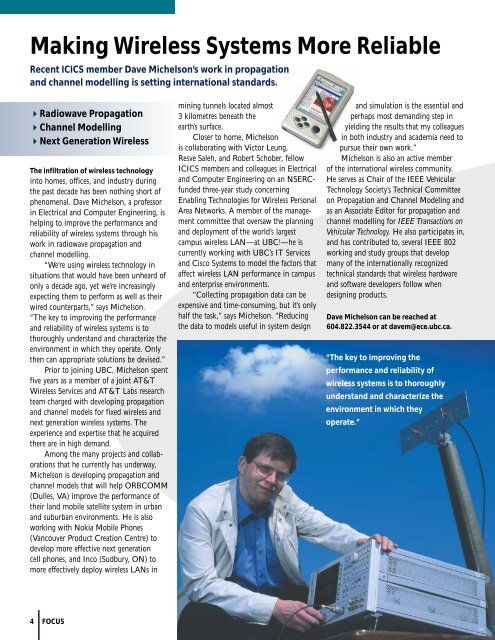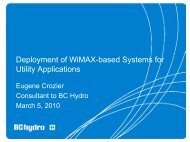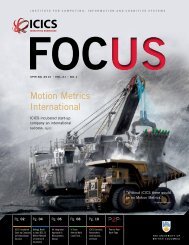FOCUS Spring 2004 - ICICS - University of British Columbia
FOCUS Spring 2004 - ICICS - University of British Columbia
FOCUS Spring 2004 - ICICS - University of British Columbia
Create successful ePaper yourself
Turn your PDF publications into a flip-book with our unique Google optimized e-Paper software.
Making Wireless Systems More Reliable<br />
Recent <strong>ICICS</strong> member Dave Michelson’s work in propagation<br />
and channel modelling is setting international standards.<br />
Radiowave Propagation<br />
Channel Modelling<br />
Next Generation Wireless<br />
The infiltration <strong>of</strong> wireless technology<br />
into homes, <strong>of</strong>fices, and industry during<br />
the past decade has been nothing short <strong>of</strong><br />
phenomenal. Dave Michelson, a pr<strong>of</strong>essor<br />
in Electrical and Computer Engineering, is<br />
helping to improve the performance and<br />
reliability <strong>of</strong> wireless systems through his<br />
work in radiowave propagation and<br />
channel modelling.<br />
“We’re using wireless technology in<br />
situations that would have been unheard <strong>of</strong><br />
only a decade ago, yet we’re increasingly<br />
expecting them to perform as well as their<br />
wired counterparts,” says Michelson.<br />
“The key to improving the performance<br />
and reliability <strong>of</strong> wireless systems is to<br />
thoroughly understand and characterize the<br />
environment in which they operate. Only<br />
then can appropriate solutions be devised.”<br />
Prior to joining UBC, Michelson spent<br />
five years as a member <strong>of</strong> a joint AT&T<br />
Wireless Services and AT&T Labs research<br />
team charged with developing propagation<br />
and channel models for fixed wireless and<br />
next generation wireless systems. The<br />
experience and expertise that he acquired<br />
there are in high demand.<br />
Among the many projects and collaborations<br />
that he currently has underway,<br />
Michelson is developing propagation and<br />
channel models that will help ORBCOMM<br />
(Dulles, VA) improve the performance <strong>of</strong><br />
their land mobile satellite system in urban<br />
and suburban environments. He is also<br />
working with Nokia Mobile Phones<br />
(Vancouver Product Creation Centre) to<br />
develop more effective next generation<br />
cell phones, and Inco (Sudbury, ON) to<br />
more effectively deploy wireless LANs in<br />
mining tunnels located almost<br />
3 kilometres beneath the<br />
earth’s surface.<br />
Closer to home, Michelson<br />
is collaborating with Victor Leung,<br />
Resve Saleh, and Robert Schober, fellow<br />
<strong>ICICS</strong> members and colleagues in Electrical<br />
and Computer Engineering on an NSERCfunded<br />
three-year study concerning<br />
Enabling Technologies for Wireless Personal<br />
Area Networks. A member <strong>of</strong> the management<br />
committee that oversaw the planning<br />
and deployment <strong>of</strong> the world’s largest<br />
campus wireless LAN—at UBC!—he is<br />
currently working with UBC’s IT Services<br />
and Cisco Systems to model the factors that<br />
affect wireless LAN performance in campus<br />
and enterprise environments.<br />
“Collecting propagation data can be<br />
expensive and time-consuming, but it’s only<br />
half the task,” says Michelson. “Reducing<br />
the data to models useful in system design<br />
and simulation is the essential and<br />
perhaps most demanding step in<br />
yielding the results that my colleagues<br />
in both industry and academia need to<br />
pursue their own work.”<br />
Michelson is also an active member<br />
<strong>of</strong> the international wireless community.<br />
He serves as Chair <strong>of</strong> the IEEE Vehicular<br />
Technology Society’s Technical Committee<br />
on Propagation and Channel Modeling and<br />
as an Associate Editor for propagation and<br />
channel modelling for IEEE Transactions on<br />
Vehicular Technology. He also participates in,<br />
and has contributed to, several IEEE 802<br />
working and study groups that develop<br />
many <strong>of</strong> the internationally recognized<br />
technical standards that wireless hardware<br />
and s<strong>of</strong>tware developers follow when<br />
designing products.<br />
Dave Michelson can be reached at<br />
604.822.3544 or at davem@ece.ubc.ca.<br />
“The key to improving the<br />
performance and reliability <strong>of</strong><br />
wireless systems is to thoroughly<br />
understand and characterize the<br />
environment in which they<br />
operate.”<br />
4 <strong>FOCUS</strong>







